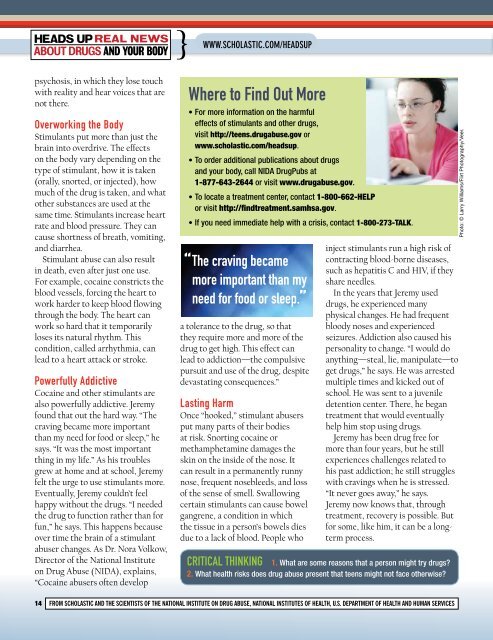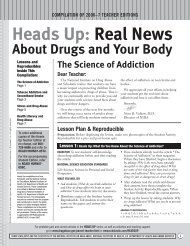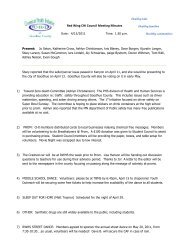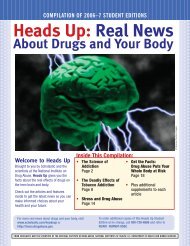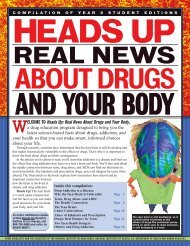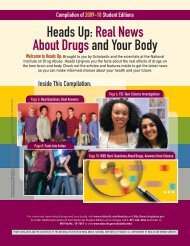Heads Up:Real News About Drugs and Your Body - Scholastic
Heads Up:Real News About Drugs and Your Body - Scholastic
Heads Up:Real News About Drugs and Your Body - Scholastic
Create successful ePaper yourself
Turn your PDF publications into a flip-book with our unique Google optimized e-Paper software.
}<br />
}<br />
www.scholastic.com/HEADSUP<br />
psychosis, in which they lose touch<br />
with reality <strong>and</strong> hear voices that are<br />
not there.<br />
Overworking the <strong>Body</strong><br />
Stimulants put more than just the<br />
ÔÔÔÔÔ ÔÔ<br />
ÔÔÔÔÔÔÔÔ<br />
brain into overdrive. The effects<br />
on the body vary depending on the<br />
ÔÔÔÔÔÔÔÔ type of stimulant, how it is taken Ô<br />
(orally, snorted, or injected), how<br />
ÔÔÔÔÔ ÔÔÔÔÔ<br />
much of the drug is taken, <strong>and</strong> what<br />
other<br />
ÔÔÔÔÔÔÔÔÔÔÔ<br />
substances are used at the<br />
same time. Stimulants increase heart<br />
rate <strong>and</strong> blood pressure. They can<br />
cause shortness of breath, vomiting,<br />
<strong>and</strong> diarrhea.<br />
Stimulant abuse can also result<br />
in death, even after just one use.<br />
For example, cocaine constricts the<br />
blood vessels, forcing the heart to<br />
work harder to keep blood flowing<br />
through the body. The heart can<br />
work so hard that it temporarily<br />
loses its natural rhythm. This<br />
condition, called arrhythmia, can<br />
lead to a heart attack or stroke.<br />
Powerfully Addictive<br />
Cocaine <strong>and</strong> other stimulants are<br />
also powerfully addictive. Jeremy<br />
found that out the hard way. “The<br />
craving became more important<br />
than my need for food or sleep,” he<br />
says. “It was the most important<br />
thing in my life.” As his troubles<br />
grew at home <strong>and</strong> at school, Jeremy<br />
felt the urge to use stimulants more.<br />
Eventually, Jeremy couldn’t feel<br />
happy without the drugs. “I needed<br />
the drug to function rather than for<br />
fun,” he says. This happens because<br />
over time the brain of a stimulant<br />
abuser changes. As Dr. Nora Volkow,<br />
Director of the National Institute<br />
on Drug Abuse (NIDA), explains,<br />
“Cocaine abusers often develop<br />
Where to Find Out More<br />
• For more information on the harmful<br />
effects of stimulants <strong>and</strong> other drugs,<br />
visit http://teens.drugabuse.gov or<br />
www.scholastic.com/headsup.<br />
•To order additional publications about drugs<br />
<strong>and</strong> your body, call NIDA DrugPubs at<br />
1-877-643-2644 or visit www.drugabuse.gov.<br />
•To locate a treatment center, contact 1-800-662-HELP<br />
or visit http://findtreatment.samhsa.gov.<br />
• If you need immediate help with a crisis, contact 1-800-273-TALK.<br />
“The craving became<br />
more important than my<br />
need for food or sleep.”<br />
a tolerance to the drug, so that<br />
they require more <strong>and</strong> more of the<br />
drug to get high. This effect can<br />
lead to addiction—the compulsive<br />
pursuit <strong>and</strong> use of the drug, despite<br />
devastating consequences.”<br />
Lasting Harm<br />
Once “hooked,” stimulant abusers<br />
put many parts of their bodies<br />
at risk. Snorting cocaine or<br />
methamphetamine damages the<br />
skin on the inside of the nose. It<br />
can result in a permanently runny<br />
nose, frequent nosebleeds, <strong>and</strong> loss<br />
of the sense of smell. Swallowing<br />
certain stimulants can cause bowel<br />
gangrene, a condition in which<br />
the tissue in a person’s bowels dies<br />
due to a lack of blood. People who<br />
inject stimulants run a high risk of<br />
contracting blood-borne diseases,<br />
such as hepatitis C <strong>and</strong> HIV, if they<br />
share needles.<br />
In the years that Jeremy used<br />
drugs, he experienced many<br />
physical changes. He had frequent<br />
bloody noses <strong>and</strong> experienced<br />
seizures. Addiction also caused his<br />
personality to change. “I would do<br />
anything—steal, lie, manipulate—to<br />
get drugs,” he says. He was arrested<br />
multiple times <strong>and</strong> kicked out of<br />
school. He was sent to a juvenile<br />
detention center. There, he began<br />
treatment that would eventually<br />
help him stop using drugs.<br />
Jeremy has been drug free for<br />
more than four years, but he still<br />
experiences challenges related to<br />
his past addiction; he still struggles<br />
with cravings when he is stressed.<br />
“It never goes away,” he says.<br />
Jeremy now knows that, through<br />
treatment, recovery is possible. But<br />
for some, like him, it can be a longterm<br />
process.<br />
CRITICAL THINKING 1. What are some reasons that a person might try drugs<br />
2. What health risks does drug abuse present that teens might not face otherwise<br />
Photo: © Larry Williams/Flirt Photography/Veer.<br />
14<br />
FROM SCHOLASTIC AND THE SCIENTISTS OF THE NATIONAL INSTITUTE ON DRUG ABUSE, NATIONAL INSTITUTES OF HEALTH, U.S. DEPARTMENT OF HEALTH AND HUMAN SERVICES


